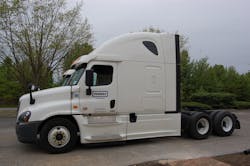Bill Combs, director-connected fleet for Penske Truck Leasing, believes there’s a multitude of ways today’s trucking fleets can use “big data” to help improve their operations. However, to truly extract the potential value from big data, motor carriers need to ensure they don’t get stuck in what he dubs “analysis paralysis.” Here are a few data management suggestions from Combs based on his experience so far turning raw numbers into fleet intelligence.
You’ve noted previously that the key to using “big data” is “having the right people managing the right data.” Illustrate that from a vehicle maintenance perspective. What types of people – technicians, fleet supervisors, etc. – need to be put in charge of specific data in order to speed up service for customers?
Here are the main “data management components” you need to think about, plus the “who” and the “why” behind each to consider:
A company’s information technology (IT) or technical team needs to manage the “big data” environment – the actual infrastructure, databases and security.
From a vehicle maintenance perspective, there are many potential data sources, such as historical maintenance data, diagnostic downloads from the vehicles themselves, seasonal volume and transactional data, etc.
An “enablement team” within the business needs to manage the data validation, data quality and access points to the data so that all users, throughout the business, have access to consistent, trustworthy and useable data sets. Expertise needed here might include data analysis, application development, design, and business intelligence. This team could sit within IT, operations, or some stand-alone organization within the business.
Ultimately, the end users need to decide how they want to “operationalize” around all of this data.
From the maintenance perspective, service technicians, fleet managers, roadside call center operators, etc. will each have the best views on how they could individually utilize data. These end users need to be “enabled” in the form of applications, dashboards, spreadsheets and integrations.
Dealing with big data for fleet managers is in many ways dealing with a “tsunami” of information. What strategies do you use to try and break that “tsunami” down into smaller, more manageable pieces?
I’d call this a “use-case” development process. As a fleet manager, you would start to document the various ways you think the data can be useful to you. Prioritize those “use-cases” based on importance to your operation and then tackle the first one. Don’t try to do too much too fast. When you decide on a first use-case, invite the business stakeholders into the fold so you have thinking partners as you begin to formulate a strategy for your use-case.
How critical is delegating responsibility for a fleet manager when it comes to using big data effectively? Many feel if a fleet manager tries to be involved in all the data analysis they’ll get spread too thin. Do you think that’s true?
Absolutely; don’t get caught up in “analysis paralysis.” What’s important is pulling value out of the data. Start with a small, clearly achievable goal and deliver on it. Try to deliver several small wins to get acclimated to the data. Build complexity into subsequent work, but only when you feel the payoff is worthwhile.
Talk about what benefits proper use of “big data” can bring to a fleet. How can it help improve efficiency, generate cost savings, etc.?
Big data can add exponential value to traditional or small data. Every business generates data from their daily practices, and good businesses have figured out ways to pull value from that data. Layering in big data (real time data or transactional data) can bring your traditional data models to life.
Finally how does using “big data” help with customer relations? How did tapping into big data make Penske more “valuable” as a resource to its customers?
This isn’t necessarily a big data example, but it shines a spotlight on the fact that fleets understand they are sitting on a treasure trove of data. They’re eager to start leveraging its dormant potential. As recently as three to five years ago, customers requesting data integration from their telematics provider to one of Penske’s back-end systems was an anomaly. It was almost always coming from our largest customers. These discussions are now becoming the norm, though, and we’re having them with our small to mid-size customers. This sort of integration capability is becoming an expectation, and is no longer “nice to have.” Meeting and exceeding expectations is very good for customer relations.
About the Author
Sean Kilcarr
Editor in Chief
Sean Kilcarr is a former longtime FleetOwner senior editor who wrote for the publication from 2000 to 2018. He served as editor-in-chief from 2017 to 2018.

